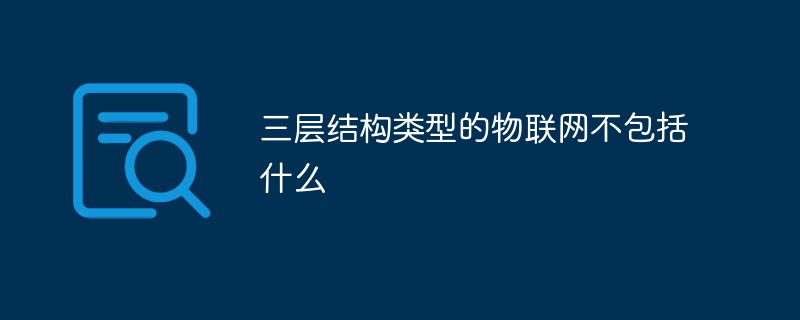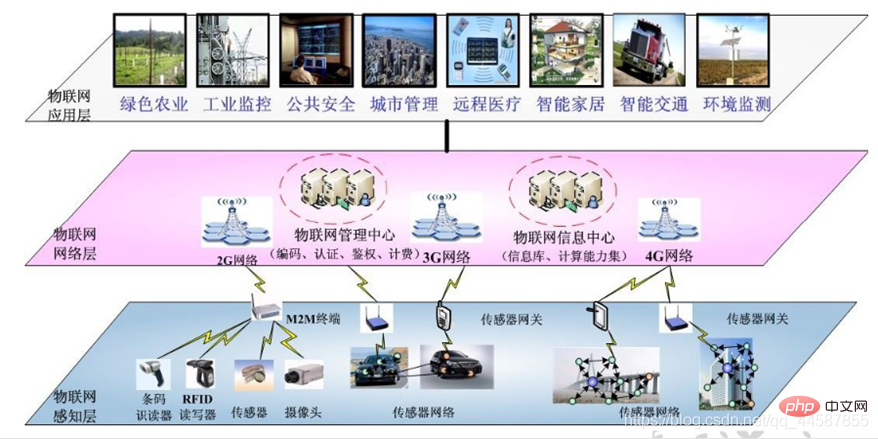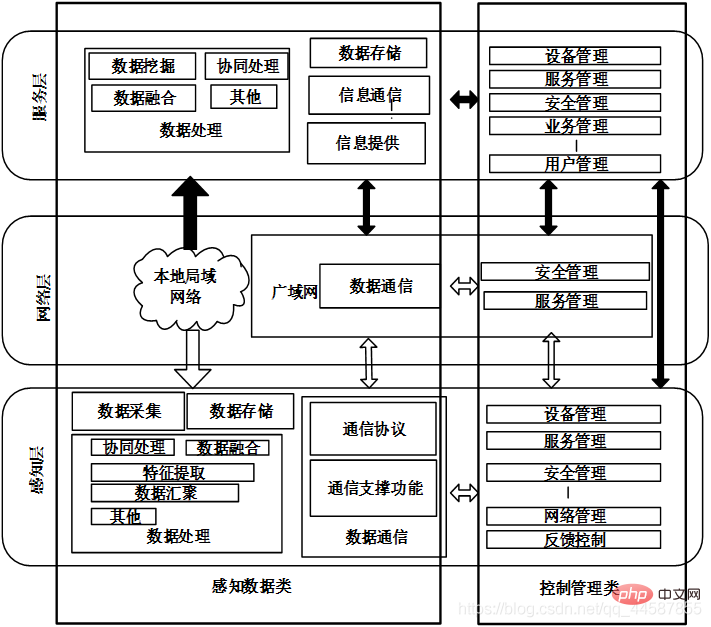
The three-layer structure type of IoT does not include the "session layer". Although there is no globally unified specification for the Internet of Things architecture, most current literature divides the Internet of Things architecture into three layers, namely the perception layer, the network layer and the application layer.

The operating environment of this tutorial: Windows 7 system, Dell G3 computer.
The three-layer structure type of IoT does not include the "session layer".
Although the structure of the Internet of Things system is complex, and the functions and scales of different Internet of Things application systems vary greatly, they must have many inherent common characteristics and draw on the research of mature computer network architecture models. Method, the Internet of Things is divided into perception layer, network layer and application layer.


The sensing layer or sensing execution layer is the Internet of Things The foundation is the link between the physical world and the virtual information world.
Classification of perception layer devices:
The important difference between the perception layer and the perception execution layer is whethersmart objects need to have both perception capabilities and control and execution capabilities, and what kind of control and execution capabilities are required.
Discussion on the development of perceptual layer technology:
The current discussion is mainly about large-scale and Low-cost RFID tags and various sensor application issues are very natural and necessary in the first stage of the Internet of Things. Just like expanding interfaces, to build an information world that corresponds to the physical world, the first thing to do is to expand the information world. nodes, and then map the nodes one-to-one with smart objects in the physical world. From then on, the perception of a single sensor will gradually develop in the direction of multi-sensory collaborative sensing and intelligent sensing of identity sensing, status sensing, location sensing, process sensing, and environment sensing.
These are the driving forces for the development of new technologies. It has a subversive effect at any time.
1. Understanding Access layer, aggregation layer and core switching layer:
(1) Basic methods of network hierarchical structure model and architecture researchDiscuss the computer network hierarchical structure model Two basic methods.application layercomputer process communication is called "Transmission network" or ''bearer Network", then the Internet's wide area network, metropolitan area network, local area network and personal area network, as well as telecommunications' mobile communication network and telephone switching network all belong to the category of transmission network.
第一种方法适合于网络理论与分层协议的研究。 第二种方法适用于网络应用系统设计与实现的研究。物联网的侧重点应该放在网络应用上,第二种抽象方法更适合。
2. Basic concepts of application system architecture:
When we first studied the Internet hierarchical structure model, the Internet structure was very complex. Practical and theoretical research, following the "top-down" design method, proposed the concept of Application System Architecture (Application Architecture). That is, talking about the analysis of a large-scale Internet application system It consists of two parts: network application and transmission network. The part that provides data transmission services for interconnected computers for process communication is called "Transmission network".
According to this idea, designers When designing a large-scale Internet application system, the first step is to focus on application layer function planning, working model and protocol design, as well as computing model and application software development; the second step is based on the application system's requirements for data transmission service quality. , choose appropriate transmission network technology and network structure. "divide and conquer" complex problems.
For more related knowledge, please visit the FAQ column!
The above is the detailed content of What does the three-layer structure type of IoT not include?. For more information, please follow other related articles on the PHP Chinese website!
 What are the applications of the Internet of Things?
What are the applications of the Internet of Things?
 The m2m concept in the Internet of Things
The m2m concept in the Internet of Things
 How to take screenshots on Huawei mobile phones
How to take screenshots on Huawei mobile phones
 The role of math function in C language
The role of math function in C language
 localstorage usage
localstorage usage
 What are the jquery plug-ins?
What are the jquery plug-ins?
 How to add css style to html
How to add css style to html
 The role of Apple's Do Not Disturb mode
The role of Apple's Do Not Disturb mode




